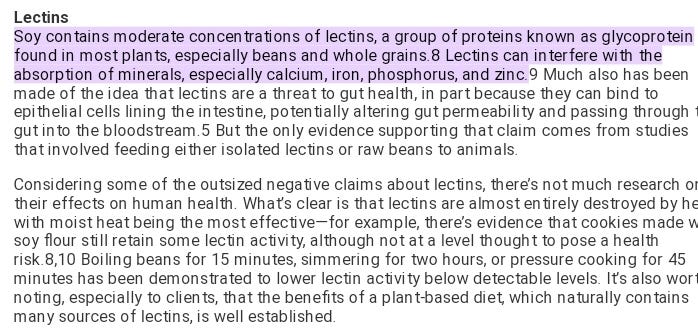I am hedging with - “It depends” - on whether the soy product is fermented traditionally- good, or if it is Round-up Ready GMO soybeans - bad; and it depends on who you are and at what stage of development.
Glyphosate GMO and ultraprocessed foods are a no for me.
Glyphosate is a negative and is worse in the Round-up crops. Just say no is what my body said to me. So I look for nonGMO or organic on labels.
Modern soy products are numerous and often not fermented as is traditional preparation. Soy beans have a higher content of nutrient binding chemicals or or other negatives which the fermentation process breaks down. https://www.sciencedirect.com/science/article/pii/S0189724115300801
I use only tofu, tempeh or miso products. Textured Vegetable Protein, soy milk or formula, edama beans or soy nuts - all are not fermented and I would avoid regular use.
Tofurky TM in the news
Tofurky TM is a plant protein deli style roast or sliced sandwich meat substitute. It may be made with tofu or wheat gluten making it a processed food rather than tofu molded into a turkey for Thanksgiving as I imagined. Sadface now. Wheat gluten would add to leaky bowel issues.
Business world news, the Tofurky company was recently purchased by a big Japanese dairy company. The author of this article thinks it is what plant protein needs - more help from food industry that has money and a foothold.
What Tofurky's Acquisition by a Dairy Subsidiary is Promising News for Plant-Based Meat, by Paul Shapiro, Feb. 13, 2023, (paulshapiro.medium.com )
Soy formula
Soy formula- as a baby nutrition specialist I spent time on formula issues and lactation. Soy formula is better tolerated than milk based by some babies but it might be a bad idea for baby boys to have it as their regular formula as the genestein is active at the estrogen receptor. Too much might affect male development.
Genestein - good or bad or good for some and bad for some?
The Karen Hurd link, one of them, in the Bean post, Beans for breast cancer? and liver health? mentioned she doesn't recommend soy at all because of the genestein potentially affecting our own hormonal balance. As a post menopausal woman I have found tofu helpful for my health and very easy to digest when my gut is flared up. I seem to want it regularly now, crave it even at times. I think it is the high quality protein as I follow a no animal products diet for autoimmune reasons.
Fiber versus digestibility.
Fiber is good up to a point and then tofu can be a nice concentrated source of digestible protein that is lower fiber than many other bean dishes.
If on a vegan diet, tofu is more concentrated protein with little fiber compared to other beans with the fibrous peels. the bulk of a vegan diet can get excessive and chewy - tiring. Children with small bodies and large nutrient needs can benefit from not having an excessive amount of fiber from a vegetarian or vegan style meal. Vegan diets are likely not a great idea for children in general. It is too easy to be low in protein and some things need to be supplemented.

Who might Soy be good for?
Score card - soy - is a good source of genistein which is an anti-inflammatory Nrf2 promoter making it a healthy high protein food. And unlike other beans it provides all the essential amino acids so it is a complete protein food for a vegan meal.
Who is soy genistein best for? - post menopausal women and anyone else in moderation as a Nrf2 promoting quality protein food.
Who is tofu good for? People with difficulty digesting protein as it is fermented like yogurt and easy to digest. Children on low meat/animal product diets or elderly people with small appetites.
Who might Soy be bad for?
Who might want to avoid soy products? Infant boys and young boys if it is a major part of the diet like formula tends to be. In moderation a soy meal should be fine for anyone.
I do recommend that everyone avoid glyphosate crops, as strictly ad possible for brain's sake and gut microbiome and digestive comfort.
Whether you digest unfermented modern soy products I will leave up to you to look into or test taste and tune in to how you feel. Depleting other nutrients from being absorbed is a chronic problem though and symptoms would likely not be changed over a short test period. Whole grains also can bind minerals and increase osteoporosis or tooth decay risks.
Today's Dietitian has an article with some cooking guidance to reduce the lectin antinutrients that bind minerals. More vigorously boiling beans for 15 minutes or simmering for two hours is recommended. Moist heat helps more than dry heat - the semi raw edamame (whole immature soy beans - green, more pea like) or roasted soy nuts would have more lectin content than whole beans boiled as a bean. Baking with soy flour reduces most of the lectin content per the article written for dietitians with tips for counseling their clients. (todaysdietitian.com)
Recipes and other information from the US soy industry affiliated Soy Connection.
Recipes for various soy products and other information that will likely be biased pro soy, is available at the US Soy Connection. An education site associated with the US soy industry. (soyconnection.com)
“Is Soy a Complete Protein?” (soyconnection.com)
Their answer is yes. And mentions that incomplete protein foods are good too in the diet, with only a partial explanation about balancing the incomplete protein foods to provide all eight or nine essential amino acids.
My quick tip is simply to remember that some grain is needed to balance with legumes, nuts or seeds, and do eat some legumes if vegan. Eating primarily nuts and seeds and grains and few beans or peas would be short on lysine in proportion to arginine. Lysine is needed for gut health and reduces viral infection risk.
The Soy Connection is accurate in stating that soy, dairy and meats would help fill in what the other plant proteins don't provide of the amino acids that we can't make for ourselves.
For more about the basics of amino acids, protein and other macro and micronutrients see the Macro & Micronutrient entry on the Glossary page of effectivecare.info or pages Nutrients and Cofactors on jenniferdepew.com.
Disclaimer: This information is being shared for educational purposes within the guidelines of Fair Use and is not intended to provide individual health guidance.




